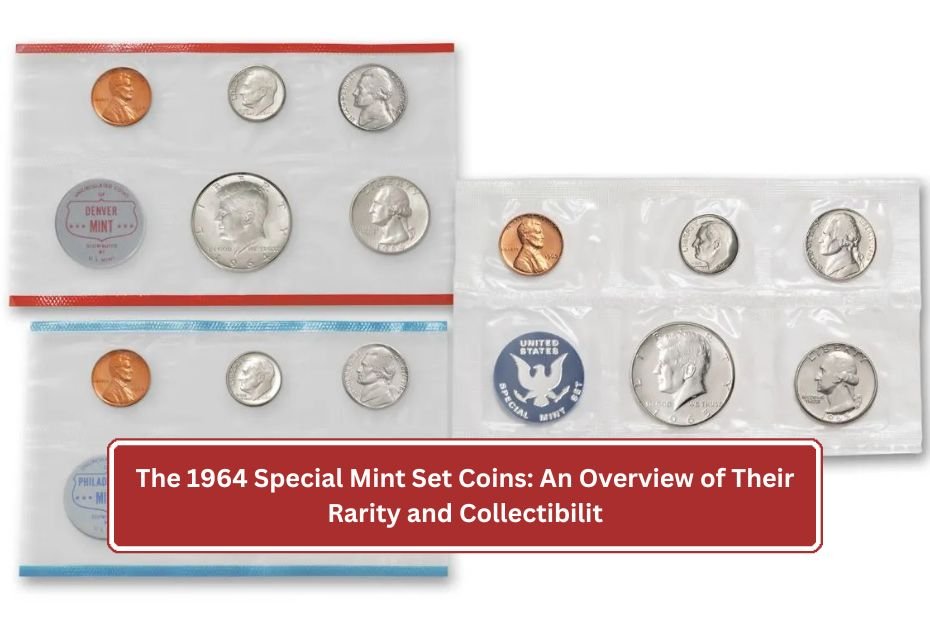The 1964 Special Mint Set (SMS) coins represent a unique chapter in American numismatics, bridging the gap between traditional minting practices and the emergence of a new era in coin production. These coins were created during a time of significant change, as the U.S. Mint transitioned away from silver coins and faced challenges in meeting the demands of a growing economy. In this article, we will delve into the background, significance, design features, and collectibility of the 1964 Special Mint Set coins.
Historical Background
In 1964, the U.S. Mint faced a crisis as the rising price of silver prompted changes in the coinage system. Following the Coinage Act of 1965, which eliminated silver from dimes and quarters and reduced the silver content in half dollars, the Mint sought to meet the needs of both collectors and the public. To address this, the Mint produced the 1964 Special Mint Set, which included coins struck with special care and presentation.
The Special Mint Set was introduced as a way to offer collectors high-quality coins that were not available through the regular circulation process. Unlike the usual mint products, which included coins intended for everyday use, the SMS coins were meant to appeal to collectors and celebrate the beauty of American coinage.
Design Features
The 1964 Special Mint Set included five different denominations, all of which featured the same designs as the circulating coins but were struck with higher quality. Here are the key features of the coins included in the set:
| Denomination | Design | Obverse Description | Reverse Description |
|---|---|---|---|
| Penny (1 cent) | Lincoln Memorial | Features President Abraham Lincoln | Depicts the Lincoln Memorial |
| Nickel (5 cents) | Jefferson Nickel | Portrait of Thomas Jefferson | Depicts Monticello |
| Dime (10 cents) | Roosevelt Dime | Portrait of President Franklin D. Roosevelt | Depicts a torch, olive branch, and oak branch |
| Quarter (25 cents) | Washington Quarter | Portrait of George Washington | Depicts an eagle with shield |
| Half Dollar (50 cents) | Kennedy Half Dollar | Portrait of President John F. Kennedy | Depicts the presidential seal |
These coins were not only notable for their designs but also for the special techniques used in their production. The SMS coins were struck using a process called “brilliant uncirculated,” which produced coins with a shiny, mirror-like finish that set them apart from regular circulating coins.
Minting History
The production of the 1964 Special Mint Set was a notable event for the U.S. Mint. Here’s a brief overview of its minting history:
| Year | Mintage | Remarks |
|---|---|---|
| 1964 | Approximately 2.4 million sets | The Special Mint Set was created in response to demand from collectors and to showcase the beauty of U.S. coins. |
Each set was packaged in a protective plastic holder, making it easy for collectors to store and display the coins. This attention to presentation contributed to the set’s appeal among collectors.
Rarity and Collectibility
The 1964 Special Mint Set coins are highly sought after by collectors for several reasons, including their unique production process and historical significance. Here’s an overview of their collectibility:
| Factor | Details |
|---|---|
| Rarity | While approximately 2.4 million sets were produced, individual coins can vary in rarity based on demand and condition. |
| Value | Prices for the 1964 Special Mint Set can range from around $10 to several hundred dollars, depending on the condition and completeness of the set. |
| Collectibility | The set is popular among both novice and experienced collectors due to its unique place in U.S. coinage history. |
Collectors appreciate the quality of the coins, their historical context, and their status as a transitional issue, making them a valuable addition to any numismatic collection.
Current Market and Preservation
The market for 1964 Special Mint Set coins remains strong, with collectors actively seeking them for their collections. If you own a set or are thinking about acquiring one, proper preservation is essential. Here are some tips for maintaining the condition of the coins:
| Preservation Tips | Details |
|---|---|
| Storage | Keep the coins in a cool, dry place to prevent tarnishing or corrosion. |
| Protective Holders | Use archival-quality holders or flips to protect against scratches and environmental damage. |
| Cleaning | Avoid cleaning coins, as this can reduce their value; instead, store them carefully to maintain their original condition. |
By following these preservation tips, collectors can ensure that their 1964 Special Mint Set coins remain in excellent condition for future generations to appreciate.
Conclusion
The 1964 Special Mint Set coins represent a unique and important moment in the history of U.S. coinage. Struck during a time of transition, these coins not only commemorate a pivotal era but also highlight the artistry and craftsmanship of American minting. With their high-quality finishes and historical significance, the 1964 Special Mint Set coins are cherished by collectors and hold a special place in the numismatic community. Whether you are a seasoned collector or just starting, the 1964 SMS coins are a remarkable testament to the enduring legacy of American coinage.
FAQ’s
What is the 1964 Special Mint Set?
The 1964 Special Mint Set is a collection of U.S. coins produced by the U.S. Mint to celebrate the quality of American coinage. It included five denominations: the penny, nickel, dime, quarter, and half dollar, all struck with a special “brilliant uncirculated” finish for collectors.
Why were the 1964 Special Mint Set coins created?
These coins were created during a transitional period in U.S. coinage when the Mint was moving away from silver content in coins due to rising silver prices. The Special Mint Set provided collectors with high-quality coins that were not available in regular circulation.
How valuable are the 1964 Special Mint Set coins?
The value of the 1964 Special Mint Set can vary based on its condition and completeness. While the entire set typically ranges from around $10 to several hundred dollars, individual coins may be worth more depending on their grading and demand among collectors.

